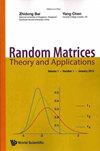Matrix deviation inequality for ℓp-norm
IF 0.6
4区 数学
Q4 PHYSICS, MATHEMATICAL
引用次数: 0
Abstract
Motivated by the general matrix deviation inequality for i.i.d. ensemble Gaussian matrix [R. Vershynin, High-Dimensional Probability: An Introduction with Applications in Data Science, Cambridge Series in Statistical and Probabilistic Mathematics (Cambridge University Press, 2018), doi:10.1017/9781108231596 of Theorem 11.1.5], we show that this property holds for the -norm with and i.i.d. ensemble sub-Gaussian matrices, i.e. random matrices with i.i.d. mean-zero, unit variance, sub-Gaussian entries. As a consequence of our result, we establish the Johnson–Lindenstrauss lemma from -space to -space for all i.i.d. ensemble sub-Gaussian matrices.
的矩阵偏差不等式ℓp-范数
受i.i.d.系综高斯矩阵的一般矩阵偏差不等式[R.Vershynin,《高维概率:数据科学应用导论》,剑桥统计与概率数学系列(剑桥大学出版社,2018),doi:10.1017/9781108231596 of Theorem 11.1.5]的启发,我们证明了这一性质适用于ℓ1≤p<;∞的p-范数和i.i.d.系综亚高斯矩阵,即具有i.i.d.均值为零、单位方差、亚高斯项的随机矩阵。由于我们的结果,我们从中建立了Johnson–Lindenstrauss引理ℓ2n空间到ℓpm空间。
本文章由计算机程序翻译,如有差异,请以英文原文为准。
求助全文
约1分钟内获得全文
求助全文
来源期刊

Random Matrices-Theory and Applications
Decision Sciences-Statistics, Probability and Uncertainty
CiteScore
1.90
自引率
11.10%
发文量
29
期刊介绍:
Random Matrix Theory (RMT) has a long and rich history and has, especially in recent years, shown to have important applications in many diverse areas of mathematics, science, and engineering. The scope of RMT and its applications include the areas of classical analysis, probability theory, statistical analysis of big data, as well as connections to graph theory, number theory, representation theory, and many areas of mathematical physics.
Applications of Random Matrix Theory continue to present themselves and new applications are welcome in this journal. Some examples are orthogonal polynomial theory, free probability, integrable systems, growth models, wireless communications, signal processing, numerical computing, complex networks, economics, statistical mechanics, and quantum theory.
Special issues devoted to single topic of current interest will also be considered and published in this journal.
 求助内容:
求助内容: 应助结果提醒方式:
应助结果提醒方式:


